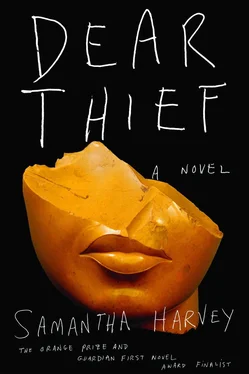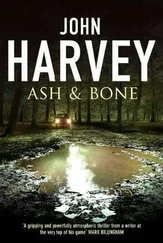I have considered that, of course. You made it clear that day on the windowsill, when you showed me the photograph of your great-grandmother scowling drably from the roadside, that you did not want a heritage. There is a type of person who does not want back, but wants out. Out! Out of the confines of yourself. You are not the type to have a sentimental relationship with your past, or to feel, like Gene, drawn back towards the valley of songs. The Jew in you is indifferent. She is sorry that the past has been one long fight, she is sorry for the suffering; sorry, but not that interested.
Heaven is for those that are masters of themselves. They can move anywhere in this world at their pleasure . Anywhere in the world, you say aloud. So why here? You take out from under the mattress the short letter Petras wrote you before he died, a letter that, in reality, might not even be in your possession. But I am giving it to you, herewith. It arrived at our house a few months after you left in January 1985, and I opened it, because you had left no forwarding address and because I owed you no discretion. Whether it ever ended up in your hands depends, I suppose, on Nicolas, whether he passed it on to you when he saw you next, or else sent it to you later, and this is for only you and him to know. But here, I have stashed it under your mattress and given you the will to look at it again.
As you see, it describes great happiness at the prospect of a free country now that Gorbachev has come. He is so young, Petras enthuses. So progressive! Attached to the letter is a newspaper clipping with a picture of Gorbachev; the clipping is seventeen years old now, and looks it. You inspect his square, strong face, fascinated by the violent wound of a birthmark and the downturned mouth that appears so kind. So unassailable, yet avuncular, so trustworthy; he is the sort of man you have to assimilate all at once, because the separate parts of him don’t add up.
Meanwhile Petras and his scientist friends are planning to test the eutrophication of Lake Drūkšiai to see if the nuclear-power station has warmed the water, and this all sounds hopeful and noble indeed, and with Gorbachev and his reforms on the scene they might even be able to publish their results. You let the letter drop to the floor. Five months later Petras will over-indulge his love of a drink and will spread himself face-down on the roof of a car that is hurtling along a dark lane and will die laughing, as will his friend who is driving. Weeks away from forty and he dies the death of a teenager.
Why have you put me here? you say. Punishment? To teach me a lesson? You were always the coward in a family of heroes; it was the others who fought the fight, and that they only sometimes won is testament to their courage. This is what you think I am trying to tell you now by trapping you here, still alive, in a country the rest of your people have left, either by accident or design. That you are a coward. I have consigned you to pining for those who were bolder than you. I have you craning your neck backwards. I know you feel you have tolerated me enough, my insinuations and implications. I am a coward , you say. So what? I never claimed to be anything else . You lie flat. All this with Petras; why must you be forced to rub up against terrible loss that cannot be undone when all you want is to be free, and when I know that this is all you want, and take it from you out of cruelty.
I have contemplated, between this paragraph and the last, a peace offering. How about if you put on your shawl, take some oatcakes and a bit of leftover chicken in some newspaper from the pile by the stove, and walk out along the track towards the only building in the vicinity, where the barking dog must be tied up. I have given you this building, and this sudden compassion for the dog, out of sheer love and friendship. It seems wrong for you to be so alone. But I think, when I approach you with this idea about the chicken and oatcakes, you shake your head. I see you sit up on the charpoy and look intently ahead as if I were sitting opposite; you are wearing that look, the one you reserve for arguments you don’t intend to lose. You straighten your back a little for dignity. Do you think you have punished me? you say. You will have to try harder than that; let the thing bark.
So, deep into the night, it does.
As I say, I am not a gentle person. I have not succeeded in becoming one, despite my efforts.
At work I was called in and asked how I had allowed that fight to happen, and at first I said the usual things, like there being nothing I could do, and that I had stopped it as soon as I was able, but we all knew that if it had been another member of staff on duty the fight would not have happened.
Why? Because I suppose I liked it happening. Of course I could have stopped it, but I enjoyed the flare of energy ripping through that room, and I wanted heartrates up. I wanted them to be angry again, instead of lost. We find ourselves in anger, we shout and there we are. I appreciated the bit of pink on Claudia’s wrist where Frank had grabbed her. I thought: She flushes still! Her body is alive enough to object to violence against it. She feels pain. Good. They want to smoke their lungs down to burnt prunes: encourage them. If their lungs can wither, that means they are living things, since only living things wither. We let elderly people smoke forty a day because we think it no longer matters, they are as good as dead anyway so we let them do what they like. But I say do more than let them, it matters more than ever that they smoke, because only living things can smoke, wither, go pink in the wrist, reel out a slap, spit the word bastard, hurl a teaspoon, a shoe, a cup, be angry about what happens in Australia, feel pain, protest.
There is that little bit of savagery in me that my grandmother did try, to her credit, to smooth away. She would say that it was always better to be peaceful and non-reactive and I don’t think she would agree that we find ourselves in anger. On the contrary, we lose ourselves. But she didn’t manage to take the last few thorns out of my side. Eventually I admitted at work that I had probably not done enough to keep control, and they talked to me at length about insurance, health-and-safety, legal responsibility, moral responsibility, in loco parentis. In loco parentis . At the age of their children we are asked to act as their parents.
And so I spent my breaktime watching over Gene’s sleeping body, trying to glue together a porcelain statuette of a boxer puppy that had lived on the mantelpiece and been broken by something like a slipper, trying without success to imagine myself as Gene’s parent. I can tell you I felt indignant on Gene’s behalf that I should be asked to make him half a man like this, while I somehow, in this little shuffle of roles, became twice a woman. But I tried it, to feel that protective care I mean, to want to dandle his aged, frightened spirit while it creeps towards the next world; to let him be done for. To let him have nothing left to be angry about.
Since telling me about M that day he hardly speaks, to me or anybody. He keeps some interest in the things of life (like the remote control, which he obsessively dismantles and rebuilds), but he seems to have lost much investment in what happens to himself. I get the feeling he has come here to do one thing only, and that is to die with as little trouble to others as possible. Some days he barely gets out of bed and barely even wakes up, and he sleeps on top of the covers completely naked and with the window wide open. This made it all the more surprising when he said to me the other day, with sudden force, ‘I should have chased her.’ It was just after the fight, when everybody else went out into the garden and he was still at the table reassembling the remote control. He raised his head as I walked towards him and inspected the mess in the room. ‘I should have chased her,’ he stated as a fact. ‘Who?’ I asked. Because he said nothing I asked, eventually, ‘M?’ He nodded. ‘Do you regret it?’ I asked. ‘Yes!’ he said, pressing the side of his fist into the table.
Читать дальше












